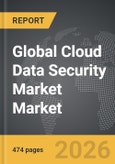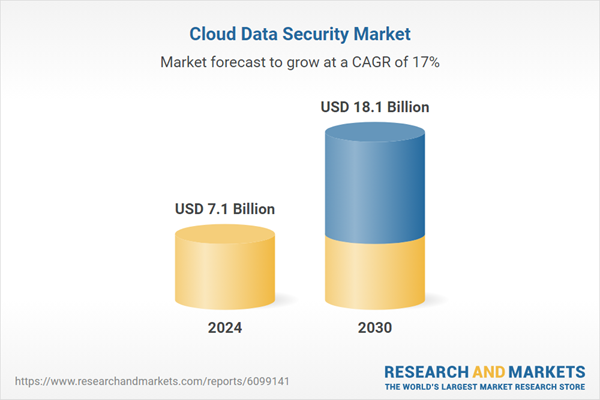Global Cloud Data Security Market - Key Trends & Drivers Summarized
Why Is Cloud Data Security Now a Core Priority Across Digital Enterprise Architectures?
As organizations accelerate cloud adoption to drive scalability, agility, and remote accessibility, safeguarding sensitive data in cloud environments has become a critical component of enterprise risk management. The expansion of hybrid and multi-cloud infrastructures, fueled by digital transformation initiatives, is introducing new complexities in securing data across dispersed endpoints, virtualized storage systems, and interconnected applications. In this context, cloud data security has moved beyond perimeter-based models to embrace identity-centric, zero-trust frameworks that protect data at rest, in motion, and in use.The rise in sophisticated cyber threats - ransomware, insider breaches, API abuse, and misconfiguration exploits - has elevated cloud data protection to board-level discussions. Regulatory frameworks such as GDPR, HIPAA, CCPA, and sector-specific mandates are driving compliance obligations that require enterprises to implement robust encryption, access controls, and incident response protocols. As cloud becomes the foundation of modern IT infrastructure, security strategies must evolve to ensure real-time visibility, unified policy enforcement, and continuous risk monitoring across cloud-native environments.
How Are Encryption, Tokenization, and Data Loss Prevention Powering Cloud Data Security Innovation?
Advanced encryption techniques, including homomorphic encryption, bring-your-own-key (BYOK) models, and hardware security modules (HSMs), are enhancing the confidentiality and sovereignty of data hosted on third-party cloud platforms. Organizations are implementing full-disk and file-level encryption combined with key management services (KMS) to retain control over cryptographic processes. Tokenization is also gaining traction, particularly in finance and healthcare, where sensitive data such as payment information or patient records is transformed into non-sensitive placeholders to prevent unauthorized exposure.Data loss prevention (DLP) technologies are evolving to incorporate machine learning and contextual analysis, enabling real-time identification of anomalies, policy violations, and exfiltration attempts. These tools are being embedded into cloud access security brokers (CASBs) and secure access service edge (SASE) platforms to offer unified policy management across SaaS, IaaS, and PaaS environments. As organizations manage petabytes of structured and unstructured data, automation and AI-driven classification engines are becoming essential for mapping sensitive data, understanding its usage patterns, and applying controls dynamically.
Which Industries and Enterprise Use Cases Are Driving High-Priority Investment in Cloud Data Protection?
Highly regulated industries such as financial services, healthcare, and government remain the most aggressive adopters of advanced cloud data security frameworks. For these sectors, data integrity, confidentiality, and auditability are foundational to both compliance and operational continuity. Banking institutions are leveraging confidential computing and secure enclaves to protect transaction data and customer records, while hospitals are deploying HIPAA-compliant encryption and access protocols to safeguard patient health information across cloud-based EHR platforms.Meanwhile, high-growth sectors such as e-commerce, media streaming, and EdTech are prioritizing cloud security to ensure customer trust, protect digital assets, and prevent service disruption. Enterprises undergoing mergers, digital transformation, or workforce decentralization are relying on cloud data security to manage identity sprawl, support secure file collaboration, and control third-party vendor access. As organizations expand into new regions, global compliance requirements are prompting them to deploy geo-fencing, cross-border encryption, and regionalized key storage to mitigate jurisdictional risk.
How Are Vendors and Enterprises Responding to Threat Evolution, Skill Gaps, and Regulatory Demands?
Cloud service providers (CSPs) are expanding their native security offerings - integrating security controls, posture management tools, and compliance dashboards into their platforms. However, shared responsibility models mean enterprises must proactively implement layered defenses, independent assessments, and third-party security integrations. Cybersecurity vendors are responding with modular, API-driven platforms that enable faster deployment, centralized control, and adaptive threat detection tailored to dynamic cloud environments.Enterprises face persistent challenges in maintaining visibility across multi-cloud deployments, addressing misconfigurations, and bridging cybersecurity skill shortages. This is prompting increased investment in managed security service providers (MSSPs), automated configuration management, and continuous compliance monitoring. Regulatory bodies are also evolving their oversight, issuing cloud-specific guidelines and demanding demonstrable accountability from both CSPs and their clients. These pressures are pushing security teams to build more agile, audit-ready, and context-aware data protection frameworks that align with evolving business and legal expectations.
What Are the Factors Driving Growth in the Cloud Data Security Market?
The global cloud data security market is expanding in response to rising cyberattack sophistication, regulatory scrutiny, and enterprise digitalization. The convergence of cloud-native infrastructure with decentralized workforces, data-driven business models, and increased reliance on third-party applications is creating a heightened demand for security solutions that are scalable, automated, and policy-driven. Organizations are seeking tools that can adapt to dynamic cloud architectures while providing comprehensive protection across data lifecycles and threat surfaces.This demand is being further amplified by the growing realization that reputational damage and operational disruption from cloud data breaches can far exceed the cost of prevention. As zero-trust architectures, AI-driven detection, and sovereign cloud strategies continue to gain ground, the question facing the industry is whether solution providers can keep pace with real-time threat evolution and enterprise compliance expectations - while delivering scalable, context-sensitive security models that enable digital growth without compromising control, visibility, or trust.
Report Scope
The report analyzes the Cloud Data Security market, presented in terms of market value (US$). The analysis covers the key segments and geographic regions outlined below:- Segments: Component (Solutions, Services); Deployment (Public Cloud, Private Cloud, Hybrid Cloud); Organization Size (Large Enterprises, SMEs); Vertical (BFSI, IT & Telecom, Healthcare, Retail & E-Commerce, Government, Other Verticals).
- Geographic Regions/Countries: World; United States; Canada; Japan; China; Europe (France; Germany; Italy; United Kingdom; Spain; Russia; and Rest of Europe); Asia-Pacific (Australia; India; South Korea; and Rest of Asia-Pacific); Latin America (Argentina; Brazil; Mexico; and Rest of Latin America); Middle East (Iran; Israel; Saudi Arabia; United Arab Emirates; and Rest of Middle East); and Africa.
Key Insights:
- Market Growth: Understand the significant growth trajectory of the Solutions Component segment, which is expected to reach US$11 Billion by 2030 with a CAGR of a 15.6%. The Services Component segment is also set to grow at 19.4% CAGR over the analysis period.
- Regional Analysis: Gain insights into the U.S. market, valued at $1.9 Billion in 2024, and China, forecasted to grow at an impressive 22.2% CAGR to reach $3.9 Billion by 2030. Discover growth trends in other key regions, including Japan, Canada, Germany, and the Asia-Pacific.
Why You Should Buy This Report:
- Detailed Market Analysis: Access a thorough analysis of the Global Cloud Data Security Market, covering all major geographic regions and market segments.
- Competitive Insights: Get an overview of the competitive landscape, including the market presence of major players across different geographies.
- Future Trends and Drivers: Understand the key trends and drivers shaping the future of the Global Cloud Data Security Market.
- Actionable Insights: Benefit from actionable insights that can help you identify new revenue opportunities and make strategic business decisions.
Key Questions Answered:
- How is the Global Cloud Data Security Market expected to evolve by 2030?
- What are the main drivers and restraints affecting the market?
- Which market segments will grow the most over the forecast period?
- How will market shares for different regions and segments change by 2030?
- Who are the leading players in the market, and what are their prospects?
Report Features:
- Comprehensive Market Data: Independent analysis of annual sales and market forecasts in US$ Million from 2024 to 2030.
- In-Depth Regional Analysis: Detailed insights into key markets, including the U.S., China, Japan, Canada, Europe, Asia-Pacific, Latin America, Middle East, and Africa.
- Company Profiles: Coverage of players such as AgileMD, Allscripts Healthcare Solutions, Athenahealth, Cambio Healthcare Systems, Cerner Corporation and more.
- Complimentary Updates: Receive free report updates for one year to keep you informed of the latest market developments.
Some of the 42 companies featured in this Cloud Data Security market report include:
- Acronis International GmbH
- Amazon Web Services, Inc.
- Broadcom Inc.
- Check Point Software Technologies Ltd.
- Cisco Systems, Inc.
- CrowdStrike Holdings, Inc.
- Fortinet, Inc.
- Google LLC
- IBM Corporation
- Imperva, Inc.
- McAfee Corp.
- Microsoft Corporation
- Netskope, Inc.
- Orca Security Ltd.
- Palo Alto Networks, Inc.
- Proofpoint, Inc.
- SentinelOne, Inc.
- Sophos Ltd.
- Trend Micro Incorporated
- Zscaler, Inc.
This edition integrates the latest global trade and economic shifts into comprehensive market analysis. Key updates include:
- Tariff and Trade Impact: Insights into global tariff negotiations across 180+ countries, with analysis of supply chain turbulence, sourcing disruptions, and geographic realignment. Special focus on 2025 as a pivotal year for trade tensions, including updated perspectives on the Trump-era tariffs.
- Adjusted Forecasts and Analytics: Revised global and regional market forecasts through 2030, incorporating tariff effects, economic uncertainty, and structural changes in globalization. Includes historical analysis from 2015 to 2023.
- Strategic Market Dynamics: Evaluation of revised market prospects, regional outlooks, and key economic indicators such as population and urbanization trends.
- Innovation & Technology Trends: Latest developments in product and process innovation, emerging technologies, and key industry drivers shaping the competitive landscape.
- Competitive Intelligence: Updated global market share estimates for 2025, competitive positioning of major players (Strong/Active/Niche/Trivial), and refined focus on leading global brands and core players.
- Expert Insight & Commentary: Strategic analysis from economists, trade experts, and domain specialists to contextualize market shifts and identify emerging opportunities.
Table of Contents
Companies Mentioned (Partial List)
A selection of companies mentioned in this report includes, but is not limited to:
- Acronis International GmbH
- Amazon Web Services, Inc.
- Broadcom Inc.
- Check Point Software Technologies Ltd.
- Cisco Systems, Inc.
- CrowdStrike Holdings, Inc.
- Fortinet, Inc.
- Google LLC
- IBM Corporation
- Imperva, Inc.
- McAfee Corp.
- Microsoft Corporation
- Netskope, Inc.
- Orca Security Ltd.
- Palo Alto Networks, Inc.
- Proofpoint, Inc.
- SentinelOne, Inc.
- Sophos Ltd.
- Trend Micro Incorporated
- Zscaler, Inc.
Table Information
| Report Attribute | Details |
|---|---|
| No. of Pages | 474 |
| Published | January 2026 |
| Forecast Period | 2024 - 2030 |
| Estimated Market Value ( USD | $ 7.1 Billion |
| Forecasted Market Value ( USD | $ 18.1 Billion |
| Compound Annual Growth Rate | 17.0% |
| Regions Covered | Global |









